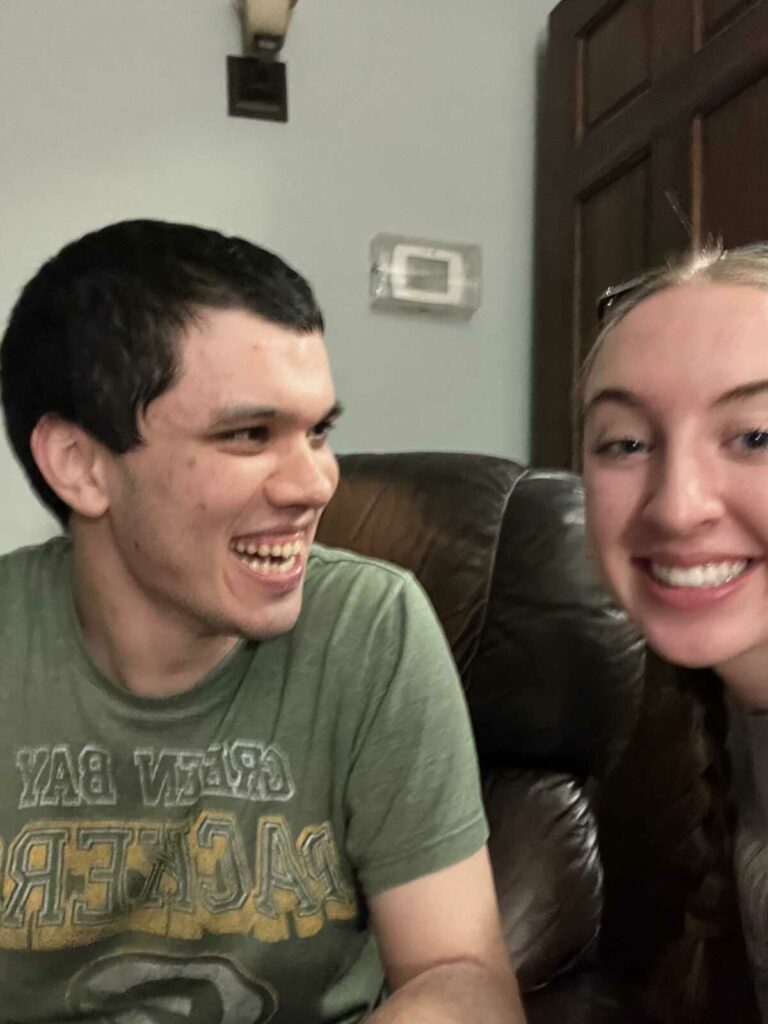Intern Spotlight: Ava Roufs, pre-PA
Attending: UMN – Twin Cities
Major: Neuroscience
Career Path: I'm on a Pre-PA track which I'm excited about because it allows for a diverse healthcare education and the flexibility to try out different specialties within the career!
Starting Out: I found out about ACR through a UMN virtual job fair. With interests in healthcare, I was searching for an opportunity to gain patient care experience. ACR offered the perfect chance to pursue this, since they welcome and train individuals with no previous direct care experience. It was intimidating initially, but the training and staff at both the office and my house helped me to build confidence and feel more prepared in my role as a direct care staff. Overall, my first impression was that the ACR community seemed welcoming, encouraging, and passionate!

"After some time in becoming more comfortable in my role with the residents, I realized I wanted to do something even more meaningful."
Coming Alongside the Resident: The internship program through ACR seemed like a perfect opportunity to pursue this, encouraging a focus on improvement of resident lives based on an intervention or research-based approach. I also figured this would be a great chance for me to build on skills that would help prepare me for my future career.
Continued Impact: My internship focused on the gut-brain-microbiome axis and its potential modulatory effects on sleep duration. I attempted to utilize this connection by implementing a probiotic yogurt for my resident who struggles with inadequate sleep duration and early wake times. Based on previous research, it was hypothesized that increasing my resident’s gut microbiome diversity through use of a probiotic could lead to an increase in sleep duration. Prior to and during the course of the probiotic implementation, sleep duration was measured and tracked through SharePoint charting and a Withing's sleep mat. Results unfortunately displayed an insignificant difference between sleep duration prior to versus during probiotic implementation. Confounding variables such as diagnoses, diet, medications, and medical history likely had their impacts on my resident's gut microbiome and connection to the brain, and therefore had to be considered when discussing the observed results.
What were the challenges during your internship? The greatest challenge I faced throughout my internship was simply accepting the fact that there were so many variables involved, and that insignificant results were likely to occur because of this. Because the connection I focused on is so complex, it makes sense that any related solutions would also be complex. Taking on this topic was ambitious, and while that idea challenged me at first, I was so intrigued by what I was learning that I pursued it anyway. Considering that most scientific studies yield insignificant results at some point in their development, I am grateful that I gained some early exposure to this experience.
What skills did you gain/develop through your internship? At the start, I gained experience in idea formation, reading scientific papers, and communicating with my RS, RN, coworkers, and resident's guardian. Collaboration and communication with other staff always remained important and provided me with leadership opportunities. I continued to build my knowledge pool about the gut, brain, microbiome, and sleep as the project went on, which helped me form a solid foundation of information regarding my topic. Towards the end of the project, I practiced data analysis skills, ran statistical tests, and created visual representations of my data. I was also able to improve upon my oral and written presentation skills through creating a scientific-style paper and slideshow that summarized my internship.
Takeaways:
- Personalized care is everything. While this was already true for my work as a DCP, this proved even more important while developing my internship project. Knowing my resident, house routines, and coworkers allowed for a quality plan that encouraged efficiency and collaboration all around.
2. The impact of a project doesn't solely rely on the significance of its results. While I did not observe the results I would have hoped for, the amount of knowledge gained, and consideration of error sources allowed for many proposed future directions related to this topic. I hope that my project presents itself as a helpful steppingstone for further gut health or sleep-related internships to come.
Advice for Future Interns: While creating an entire project and completing all the requirements can seem daunting at first, guidance from your mentor and flexibility with timing really allow for an encouraging and low-stress internship experience. Also, choosing a topic that you are really interested in or that mitigates a significant problem for your resident helps to make the project feel more manageable and impactful.
Benefits of an ACR Internship? I think an ACR internship offers a great opportunity to become very knowledgeable in a specific area with the goal of improving the lives of your residents. I also think that the improvement of skills related to professionalism, communication, and scientific writing/reading offers advantages to those looking to go on to graduate school or other career paths.
